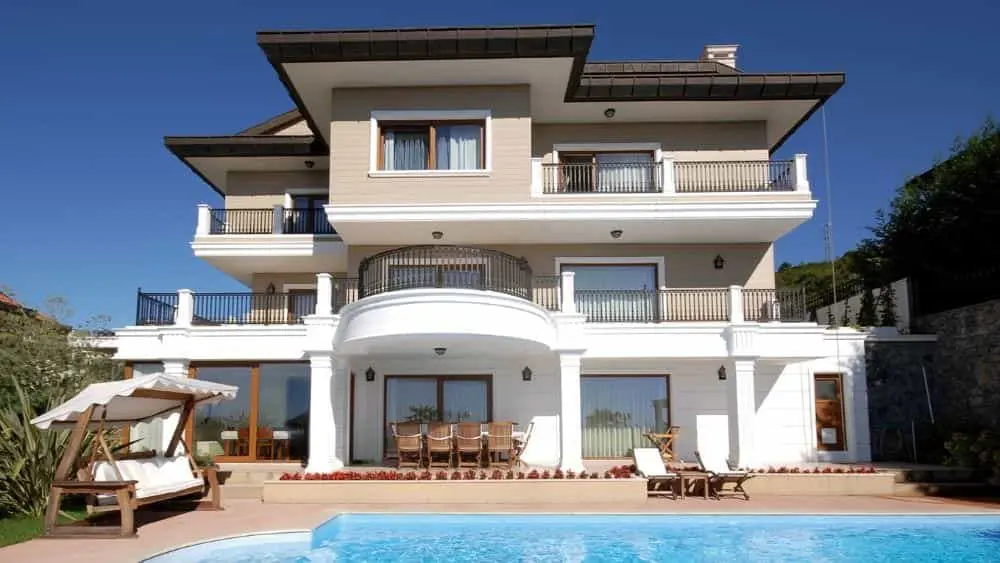
Building a luxury home from scratch or choosing to remodel an existing home?
Both options allow you to achieve the home of your dreams, but how do you decide which path is right for you?
When deciding whether to build new or remodel an existing home, choosing a location is an important part of the initial decision set, according to Kira Sterling, senior vice president/CMO-Marketing at Toll Brothers.
When choosing a home to remodel, you have to take into account location carefully, looking at what is going on in the neighborhood — are other homes undergoing renovations and what are the comps?
“In new-home neighborhoods, all of the homes are of the same luxury quality and, for future resale value, that provides a constant and reliable indicator,” Sterling says. “For an investment, if you are doing a renovation, you should have a degree of comfort where you build.”
Depending on the level of renovation planned or needed, the home could risk becoming over-valued for the neighborhood if not built consistent with the other homes, and that, in turn, could hurt future resale opportunities.
“Your neighbors will love you, but your home’s appraisal will be out of line with the others,” says Damon Bradley, sales manager at Maryland-based Williamsburg Homes.
Bradley adds that it’s important to evaluate the exterior and interior space constraints of potential renovation properties, as well as any permitting issues.
“Many older homes don’t have the design features that today’s homes do. Is it possible to renovate it the way you want? You may be constrained by what the home or lot will allow for, unless you do practically a whole tear down,” he says.
Some people enjoy the challenge of renovating a historical home or like the idea of living in a piece of history and acknowledge (or even welcome) the ups and downs and surprises that a renovation can bring their way. However, if it’s just a matter of getting what you want in a home, you need to consider which trade-offs are acceptable to you, such as making concessions for load-bearing walls or replacing old floor joists to handle a new tile floor.
“In most renovations, you still take some element of the past or have to make certain compromises,” Sterling says. “You’re working with someone else’s raw materials.”
Bradley suggests taking a holistic view of the renovation process, from blueprint to costs. “You have to consider the shelf life of everything in an existing house and factor in the cost of replacing it.”
A home inspection can assess the condition of a home’s key features, such as HVAC, the roof and windows, insulation and electrical amperage. These items combined with tear-down costs and various architectural and design changes, from a kitchen or bath re-do to fixtures and lighting and flooring, can provide an overall assessment of out-of-pocket expenses that will be added to the purchase price of the home, says Bradley.
He points out that in a new home, the customization costs can be rolled into the overall home mortgage, possibly costing a fraction less than the out-of-pocket costs for a remodel.
In addition, with renovation comes hiring a reputable general contractor and other necessary experts, such as an architect, interior designer and landscaper, but by building new, all of those roles are handled in-house.
“In many cases, luxury buyers don’t have the time to focus on all of the details,” Sterling says. “An advantage of new construction is that the builder handles all of the details for you.”
She points to Toll Brothers’ central design studio as an example. “We keep the design experience under one roof and our clients get to make a series of personal choices, but the choices are not infinite.”
That can take some pressure off and, more important, save the client valuable time, she adds.
While both new construction and remodels can experience delays due to weather, back-ordered materials or other factors, having a contract for a new construction home imparts a certain amount of discipline to stay on track, both for client and builder.
At the end of the day, it’s really about the quality of life you’re looking for, says Bradley. “In a new home, you are focused on personalizing your property instead of fixing it. Ask yourself whether you want a to-do list when you move in or a fun list.

Judy Marchman is an Austin, Texas-based freelance writer and editor who, during her 20+-year career, has written on a diverse number of topics, from horses to lawyers to home building and design, including for NewHomeSource.com. Judy is the proud owner of a new construction home and has gained plenty of story inspiration from her home ownership experiences.
A horse racing aficionado, she also has written on lifestyle, personality, and business topics for Keeneland magazine and Kentucky Monthly, as well as sports features for BloodHorse, a weekly Thoroughbred racing publication, and the Official Kentucky Derby Souvenir Magazine. When she’s not in front of her laptop, Judy can usually be found enjoying a good book and a cup of tea, or baking something to go with said cuppa.
 Choosing a Color Scheme for Your New Home
Choosing a Color Scheme for Your New Home
Todd Stauffer
I love how you said that building a luxury home is nice because the customization is rolled into the mortgage, making it cheaper. My wife and I are getting really sick of the layout of our current home but we are also not very wealthy. Being able to get the home we want without paying quite as much would be really great! We’ll have to look into it.